World Premier International Research Center Initiative(WPI)
EMBO meets WPI: Connecting Global Research Communities
Guillaume Parodi, Engagement Officer of EMBO (European Molecular Biology Organization), reports on the exciting first-ever collaborative event between EMBO and WPI.
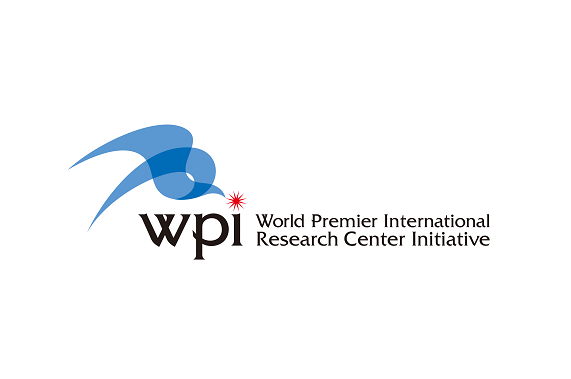
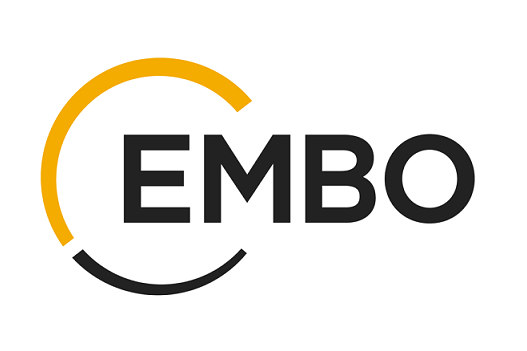
From 27 June to 1 July 2025, EMBO hosted a delegation from the World Premier International Research Center Initiative (WPI) in Heidelberg, Germany to promote scientific exchange between EMBO communities and Japan.
Fifteen researchers from Japan highlighted one of the country’s flagship programmes, the World Premier International Research Center Initiative (WPI), shared their science, discussed the challenges of global research careers and had the opportunity to attend the annual EMBO Fellows’ Meeting that gathered more than 100 EMBO Postdoctoral Fellows.
Participants learned about the structure and the different research lines conducted at WPI centres, while representatives from the JSPS office in Bonn, Germany, introduced JSPS’s funding schemes for international research collaboration, including fellowship programmes and joint research opportunities to work in or with Japan.
Fifteen researchers from Japan highlighted one of the country’s flagship programmes, the World Premier International Research Center Initiative (WPI), shared their science, discussed the challenges of global research careers and had the opportunity to attend the annual EMBO Fellows’ Meeting that gathered more than 100 EMBO Postdoctoral Fellows.
Participants learned about the structure and the different research lines conducted at WPI centres, while representatives from the JSPS office in Bonn, Germany, introduced JSPS’s funding schemes for international research collaboration, including fellowship programmes and joint research opportunities to work in or with Japan.

Spotlight on Science
The WPI delegation consisted of 13 postdoctoral researchers working at various WPI centres throughout Japan. KAIBUCHI Kozo, Deputy Program Director of the WPI programme and Director of the Center for Medical Science at Fujita Health University, led the delegation and was accompanied by OCHIAI Mariko of JSPS Headquarter in Japan. SAITOU Mitinori, EMBO Associate Member and Director of the Institute for the Advanced Study of Human Biology (WPI-ASHBi) at Kyoto University, led the scientific part of the delegation as Director of a WPI centre. Two delegates from the JSPS Bonn Office, HAYASHI Masahiko, Director of the JSPS Bonn office and ANNO Eri, Deputy Director, were also part of the delegation.
The WPI delegation consisted of 13 postdoctoral researchers working at various WPI centres throughout Japan. KAIBUCHI Kozo, Deputy Program Director of the WPI programme and Director of the Center for Medical Science at Fujita Health University, led the delegation and was accompanied by OCHIAI Mariko of JSPS Headquarter in Japan. SAITOU Mitinori, EMBO Associate Member and Director of the Institute for the Advanced Study of Human Biology (WPI-ASHBi) at Kyoto University, led the scientific part of the delegation as Director of a WPI centre. Two delegates from the JSPS Bonn Office, HAYASHI Masahiko, Director of the JSPS Bonn office and ANNO Eri, Deputy Director, were also part of the delegation.
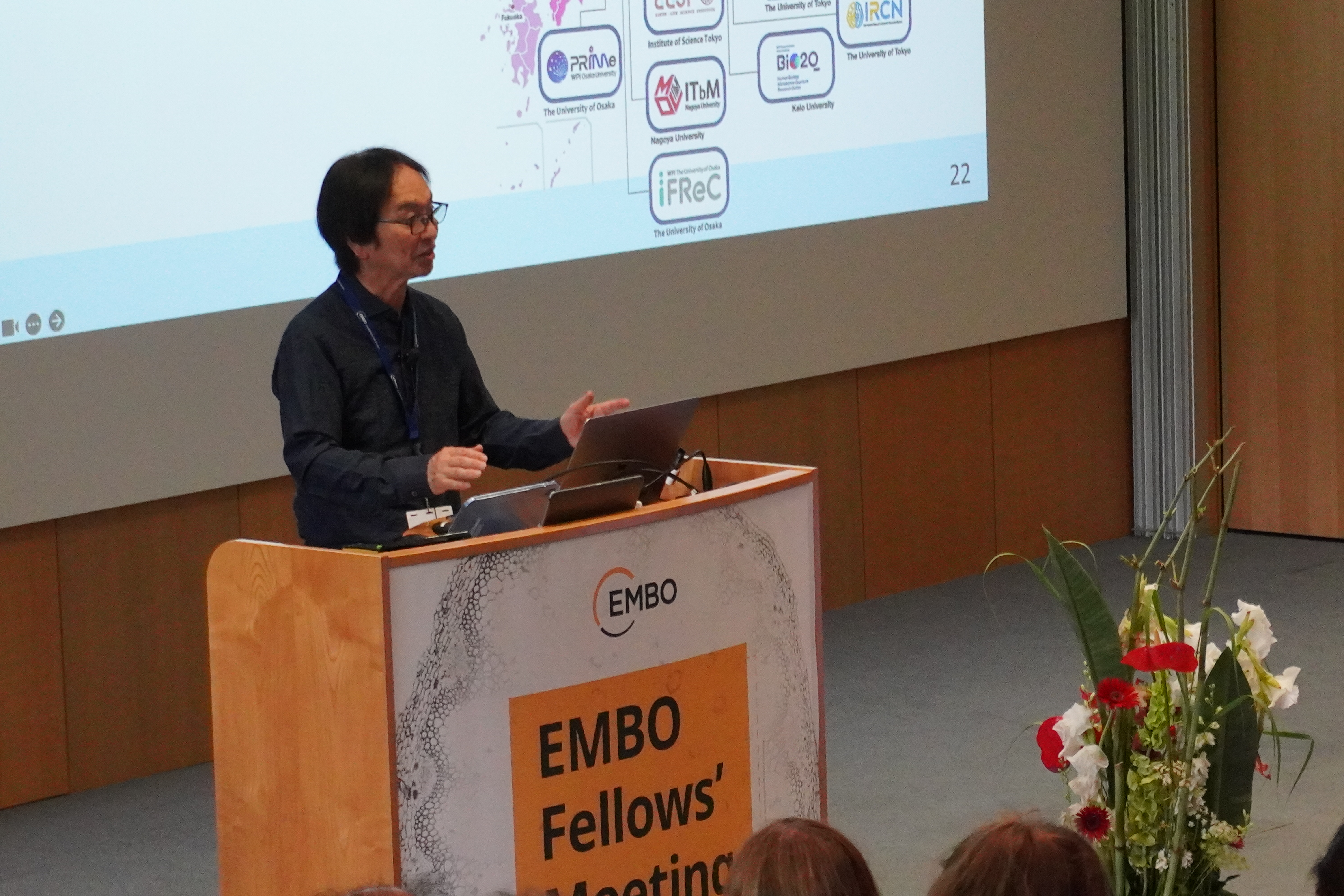
KAIBUCHI Kozo, Deputy Program Director of the WPI program
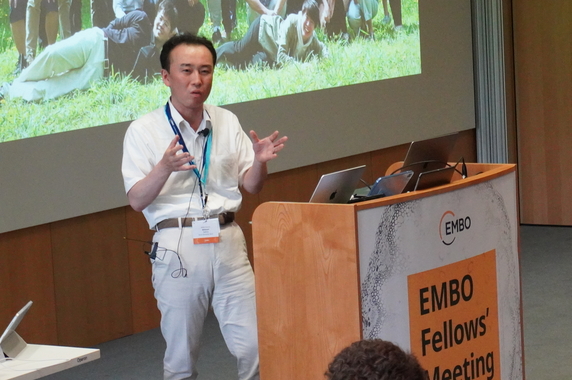
SAITOU Mitinori, Director of WPI-ASHBi
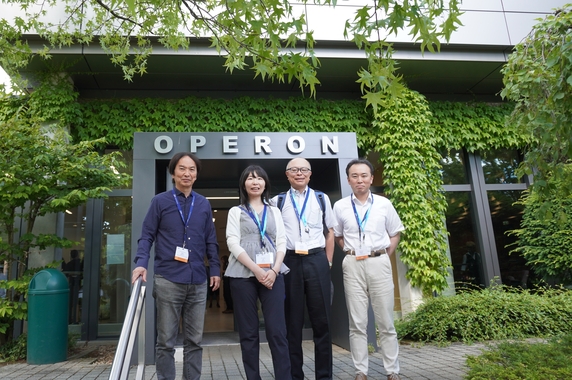
At the venue
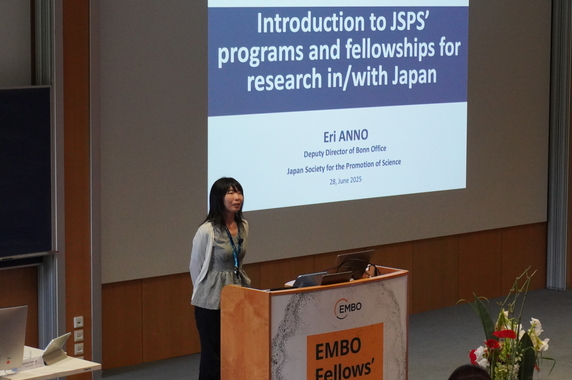
ANNO Eri, Deputy Director of JSPS Bonn Office
The event allowed for 13 postdoctoral researchers to share their work and to offer EMBO Postdoctoral Fellows with an outlook on the works carried at the WPI centres.
Postdoctoral researcher SUGIYAMA Masumi, based at the International Institute for Sustainability with Knotted Chiral Meta Matter (WPI-SKCM 2) at Hiroshima University, investigates life sciences through the scope of mathematics and computer science. During her PhD studies, SUGIYAMA used knot theory to analyse the shapes of tau proteins, which can become twisted and tangled in the brain, leading to brain diseases. “The application of knot theory to protein structure can provide quantitative measures and structural complexity of proteins”, she explained. “Protein structures can therefore be classified according to their topological characteristics, and we can detect small differences that cannot otherwise been seen. I am hoping that this may bring new insights on how to better understand tau misfolding and neurodegenerative diseases.”
For MIYANISHI Kazuya, it was a once-in-a-lifetime opportunity to attend both the EMBO Meets WPI meeting and the EMBO Fellows Meeting 2025 and present his work to the community. “In my experience, research conferences are usually different in Japan”, he stated, “in the sense that our scientific meetings are usually smaller and we would probably not have the chance at this career stage to meet so many talented people from so many different countries.” His work, conducted at the International Institute for Integrative Sleep Medicine (WPI-IIIS) at the University of Tsukuba, delves into the molecular mechanisms underlying the regulation of REM sleep. MIYANISHI carried out a large-scale study in mice focusing on how changes in their genes affect behaviour and discovered a new mouse strain, called Dreamy, that induces longer REM sleep phases. His results revealed that the Dreamy gene plays an important role in controlling REM sleep and offers new insights on how the brain regulates this vital part of sleep.
Postdoctoral researcher SUGIYAMA Masumi, based at the International Institute for Sustainability with Knotted Chiral Meta Matter (WPI-SKCM 2) at Hiroshima University, investigates life sciences through the scope of mathematics and computer science. During her PhD studies, SUGIYAMA used knot theory to analyse the shapes of tau proteins, which can become twisted and tangled in the brain, leading to brain diseases. “The application of knot theory to protein structure can provide quantitative measures and structural complexity of proteins”, she explained. “Protein structures can therefore be classified according to their topological characteristics, and we can detect small differences that cannot otherwise been seen. I am hoping that this may bring new insights on how to better understand tau misfolding and neurodegenerative diseases.”
For MIYANISHI Kazuya, it was a once-in-a-lifetime opportunity to attend both the EMBO Meets WPI meeting and the EMBO Fellows Meeting 2025 and present his work to the community. “In my experience, research conferences are usually different in Japan”, he stated, “in the sense that our scientific meetings are usually smaller and we would probably not have the chance at this career stage to meet so many talented people from so many different countries.” His work, conducted at the International Institute for Integrative Sleep Medicine (WPI-IIIS) at the University of Tsukuba, delves into the molecular mechanisms underlying the regulation of REM sleep. MIYANISHI carried out a large-scale study in mice focusing on how changes in their genes affect behaviour and discovered a new mouse strain, called Dreamy, that induces longer REM sleep phases. His results revealed that the Dreamy gene plays an important role in controlling REM sleep and offers new insights on how the brain regulates this vital part of sleep.
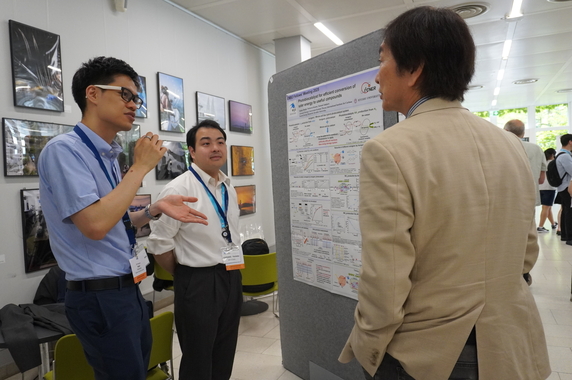
YOSPANYA Wijak (WPI-AIMR)
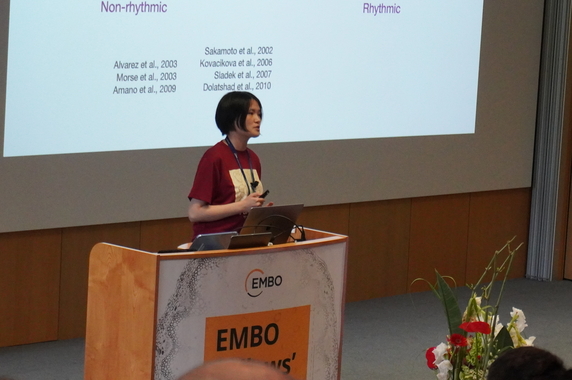
FANG Lingyan (WPI-IRCN)
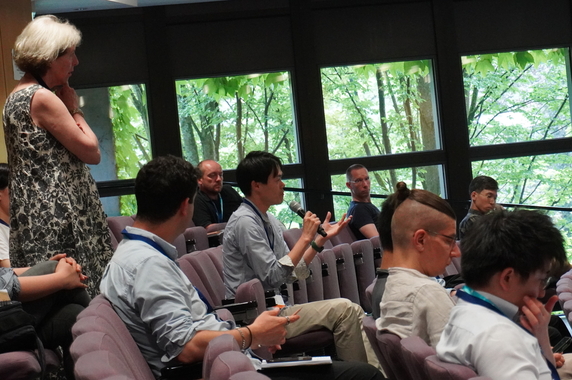
NISHIMURA Toshiya (WPI-PRIMe)
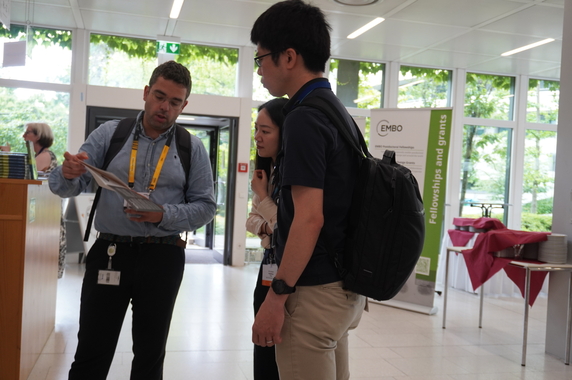
TAJIMA Kenya (WPI-ELSI)
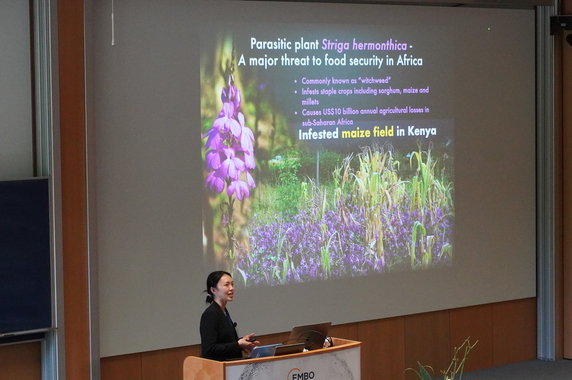
YAP Jia Xin (WPI-ITbM)
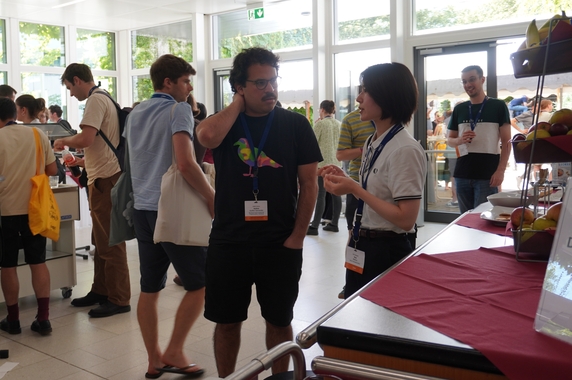
MATSUI Risa (WPI-iCeMS)
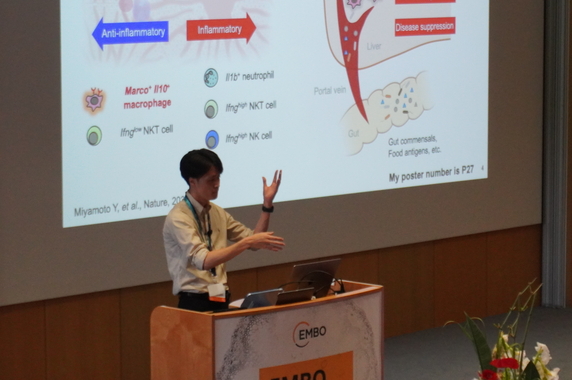
MIYAMOTO Yu (WPI-IFReC)
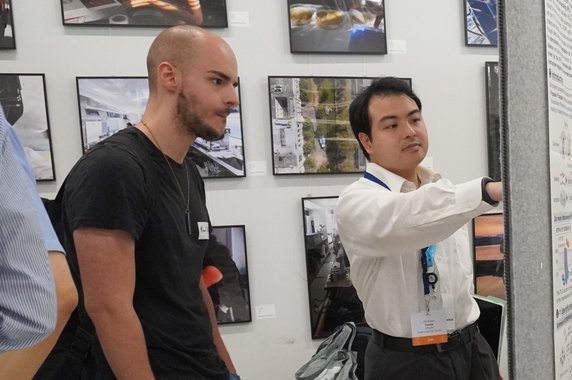
OHSAKI Yutaka (WPI-I2CNER)
Understanding the WPI Programme
Established in 2007 by the Japanese Ministry of Education, Culture, Sports, Science and Technology (MEXT), the WPI programme aims to promote scientific excellence and recognition through global partnerships, strong visibility and interdisciplinary collaboration. Today there are 18 WPI centres scattered throughout Japan, hosted by universities or research institutions. About half of the WPI centres focus on life sciences or related fields.
The Institute for Integrated Cell-Material Sciences (WPI-iCeMS) at Kyoto University, for example, merges cell biology and chemistry to understand the principles that govern intracellular self-assembly happening at the intersection between life and matter, and to create molecular tools for disease treatment, energy storage and carbon dioxide conversion.
Another WPI centre, the Immunology Frontier Research Center at the University of Osaka (WPI-IFReC), blends immunology and bioimaging to develop vaccines for infectious diseases, concept for immunity-based therapies for infectious diseases and cancers as well as methods for treating autoimmune disease.
WPI centres hold a special place in the Japanese research landscape also thanks to a high number of international researchers. About 40% of their researchers originates from overseas and this number rises to 67% for postdoctoral researchers. “Being myself a foreigner in Japan, I have a much better understanding of scientific contexts I’m more familiar with, such as China, the US or Japan”, said postdoctoral researcher PAN Huizhuo working at WPI-Bio2Q, the Human Biology-Microbiome-Quantum Research Center hosted by Keio University. “I applied for this opportunity to meet with EMBO Press editors and EMBO Postdoctoral Fellows to learn more about the European context and to connect with a wider scientific community.”
Looking ahead
For many participants, the meeting was a chance to gain insight into international research systems and (re)connect to early career researchers in Europe. Sofiane HAMIDI, an Algerian-born, French researcher working at the Institute for the Advanced Study of Human Biology (WPI-ASHBi) at Kyoto University, said the event was a way to “reconnect with Europe and a good opportunity to prepare talks.”
For others, like associate Professor Holger FLECHSIG at the Nano Life Science Institute (WPI-NanoLSI) hosted by Kanazawa University, the event offered a way to bridge their home country with their country of residence, while offering insights into molecular biophysics through scanning-probe microscopy and computational science.
Established in 2007 by the Japanese Ministry of Education, Culture, Sports, Science and Technology (MEXT), the WPI programme aims to promote scientific excellence and recognition through global partnerships, strong visibility and interdisciplinary collaboration. Today there are 18 WPI centres scattered throughout Japan, hosted by universities or research institutions. About half of the WPI centres focus on life sciences or related fields.
The Institute for Integrated Cell-Material Sciences (WPI-iCeMS) at Kyoto University, for example, merges cell biology and chemistry to understand the principles that govern intracellular self-assembly happening at the intersection between life and matter, and to create molecular tools for disease treatment, energy storage and carbon dioxide conversion.
Another WPI centre, the Immunology Frontier Research Center at the University of Osaka (WPI-IFReC), blends immunology and bioimaging to develop vaccines for infectious diseases, concept for immunity-based therapies for infectious diseases and cancers as well as methods for treating autoimmune disease.
WPI centres hold a special place in the Japanese research landscape also thanks to a high number of international researchers. About 40% of their researchers originates from overseas and this number rises to 67% for postdoctoral researchers. “Being myself a foreigner in Japan, I have a much better understanding of scientific contexts I’m more familiar with, such as China, the US or Japan”, said postdoctoral researcher PAN Huizhuo working at WPI-Bio2Q, the Human Biology-Microbiome-Quantum Research Center hosted by Keio University. “I applied for this opportunity to meet with EMBO Press editors and EMBO Postdoctoral Fellows to learn more about the European context and to connect with a wider scientific community.”
Looking ahead
For many participants, the meeting was a chance to gain insight into international research systems and (re)connect to early career researchers in Europe. Sofiane HAMIDI, an Algerian-born, French researcher working at the Institute for the Advanced Study of Human Biology (WPI-ASHBi) at Kyoto University, said the event was a way to “reconnect with Europe and a good opportunity to prepare talks.”
For others, like associate Professor Holger FLECHSIG at the Nano Life Science Institute (WPI-NanoLSI) hosted by Kanazawa University, the event offered a way to bridge their home country with their country of residence, while offering insights into molecular biophysics through scanning-probe microscopy and computational science.

About EMBO
EMBO stands for excellence in life sciences
EMBO is an organization of more than 2,100 leading researchers that promotes excellence in the life sciences in Europe and beyond. The major goals of the organization are to support talented researchers at all stages of their careers, stimulate the exchange of scientific information, and help build a research environment where scientists can achieve their best work.
EMBO helps young scientists to advance their research, promote their international reputation and ensure their mobility. Courses, workshops, lectures and EMBO Press publications disseminate the latest research and offer training in techniques to maintain high standards of excellence in research practice. EMBO helps to shape science policy by seeking input and feedback from our communities and by following closely the trends in science.
For more information visit: embo.org
About EMBO Fellowship Programme
EMBO Postdoctoral Fellows are funded up to two years to carry out their research in laboratories in Europe and elsewhere in the world. Together they form a global network of internationally mobile young scientists who have demonstrated excellence in their fields. The fellows receive funding and benefit from career development activities, such as the EMBO Lab Leadership Course.
Every year, recent fellows are invited to the EMBO Fellows’ Meeting in Heidelberg, Germany. At these meetings, the fellows present their research, share experiences, establish new contacts, and meet EMBO staff.
Since the 1960s, thousands of scientists have benefited from EMBO Postdoctoral Fellowships.
EMBO stands for excellence in life sciences
EMBO is an organization of more than 2,100 leading researchers that promotes excellence in the life sciences in Europe and beyond. The major goals of the organization are to support talented researchers at all stages of their careers, stimulate the exchange of scientific information, and help build a research environment where scientists can achieve their best work.
EMBO helps young scientists to advance their research, promote their international reputation and ensure their mobility. Courses, workshops, lectures and EMBO Press publications disseminate the latest research and offer training in techniques to maintain high standards of excellence in research practice. EMBO helps to shape science policy by seeking input and feedback from our communities and by following closely the trends in science.
For more information visit: embo.org
About EMBO Fellowship Programme
EMBO Postdoctoral Fellows are funded up to two years to carry out their research in laboratories in Europe and elsewhere in the world. Together they form a global network of internationally mobile young scientists who have demonstrated excellence in their fields. The fellows receive funding and benefit from career development activities, such as the EMBO Lab Leadership Course.
Every year, recent fellows are invited to the EMBO Fellows’ Meeting in Heidelberg, Germany. At these meetings, the fellows present their research, share experiences, establish new contacts, and meet EMBO staff.
Since the 1960s, thousands of scientists have benefited from EMBO Postdoctoral Fellowships.
